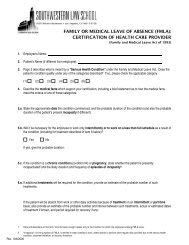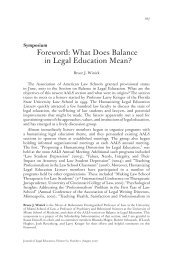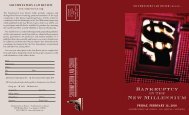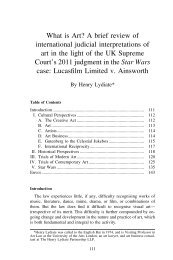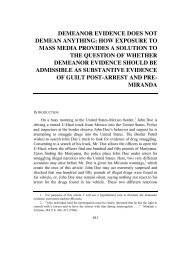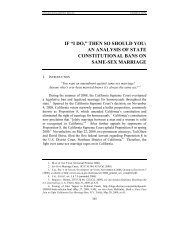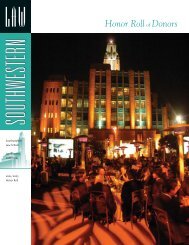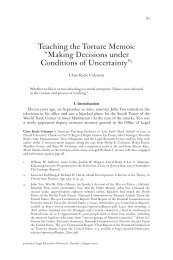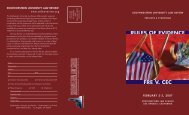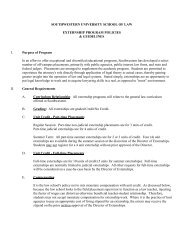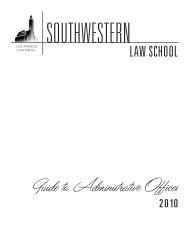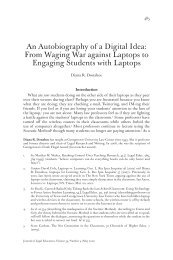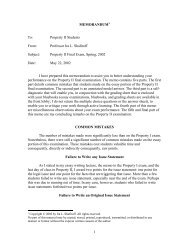Censoring the Censors in the WTO - Southwestern Law School
Censoring the Censors in the WTO - Southwestern Law School
Censoring the Censors in the WTO - Southwestern Law School
Create successful ePaper yourself
Turn your PDF publications into a flip-book with our unique Google optimized e-Paper software.
24 J. Int’l Media & Enterta<strong>in</strong>ment <strong>Law</strong> Vol. 3, No. 1<br />
This article addresses <strong>the</strong> normative question of <strong>the</strong> proper scope of a<br />
morals exception to <strong>the</strong> <strong>WTO</strong> rules from <strong>the</strong> perspective of socioeconomic<br />
legal <strong>the</strong>ory 29 and this analysis concludes that each of <strong>the</strong><br />
above-stated three questions is answered <strong>in</strong> <strong>the</strong> negative. It is important<br />
to emphasize that this conclusion does not require each <strong>WTO</strong> member to<br />
adopt a liberal democratic form of government. Such a requirement would<br />
contravene not only <strong>the</strong> jus cogens pr<strong>in</strong>ciple of <strong>the</strong> self- determ<strong>in</strong>ation<br />
of peoples 30 but <strong>the</strong> rationale for <strong>in</strong>clusion of a morals exception <strong>in</strong> <strong>the</strong><br />
<strong>WTO</strong> agreements <strong>in</strong> <strong>the</strong> first place. If a <strong>WTO</strong> member’s form of government<br />
makes it difficult or impossible for it to rely on <strong>the</strong> public morals<br />
exception, this is a situation which <strong>the</strong> member alone has chosen. Moreover,<br />
<strong>WTO</strong> members with liberal democratic forms of government should<br />
not assume that <strong>the</strong>ir form of government automatically means that each<br />
law enacted by that government’s legislature is supported by a majority<br />
of <strong>the</strong> people. 31 In o<strong>the</strong>r words, if <strong>the</strong> public morals exception to <strong>the</strong><br />
<strong>WTO</strong> rules were to be <strong>in</strong>terpreted or devised as suggested <strong>in</strong> this article,<br />
each appeal. Id. at Art. 17, 1. Each person may be reappo<strong>in</strong>ted to <strong>the</strong> Appellate Body<br />
once. Id. at Art. 17, 2.<br />
29. See text accompany<strong>in</strong>g <strong>in</strong>fra notes 375-92.<br />
30. Jus cogens (Lat<strong>in</strong> for “compell<strong>in</strong>g law”) refers to a peremptory norm of general<br />
<strong>in</strong>ternational law, which “is a norm accepted and recognized by <strong>the</strong> <strong>in</strong>ternational<br />
community of States as a whole as a norm from which no derogation is permitted and<br />
which can be modified only by a subsequent norm of general <strong>in</strong>ternational law hav<strong>in</strong>g<br />
<strong>the</strong> same character.” Vienna Convention on <strong>the</strong> <strong>Law</strong> of Treaties, Art. 53 (entitled “Treaties<br />
conflict<strong>in</strong>g with a peremptory norm of general <strong>in</strong>ternational law (‘jus cogens’)”),<br />
May 23, 1969, 1155 U.N.T.S. 331, 8 Int’l Legal Materials 679 (1969). Even “[a] treaty<br />
is void if, at <strong>the</strong> time of its conclusion, it conflicts with a peremptory norm of general<br />
<strong>in</strong>ternational law.” Id.<br />
31. Public choice <strong>the</strong>ory “appl[ies] scientific economic methods to <strong>the</strong> “public choice<br />
behavior” of voters, party leaders, and o<strong>the</strong>r politicians, lobbyists, and bureaucrats.”<br />
James Buchanan Center for Political Economy, About Public Choice Economics, available<br />
at www.gmu.edu/jbc/aboutpubchoic.html (accessed on Aug. 28, 2007). In general,<br />
public choice <strong>the</strong>ory ma<strong>in</strong>ta<strong>in</strong>s “that markets are imperfect, but that alternative <strong>in</strong>stitutions<br />
(i.e., government) may also have defects.” Id. In particular, James Buchanan’s<br />
public choice <strong>the</strong>ory helped demonstrate that an elected official <strong>in</strong> a liberal democratic<br />
government might choose to promote <strong>the</strong> <strong>in</strong>terests of just a few <strong>in</strong>dividuals or groups<br />
that appear likely to be able to assist him or her be reelected. A good example of how<br />
lobbyists can disproportionately <strong>in</strong>fluence legislation <strong>in</strong> a liberal democratic government<br />
is <strong>the</strong> fact that, dur<strong>in</strong>g <strong>the</strong> fall of 2009, both Democratic and Republican members<br />
of <strong>the</strong> U.S. Congress, when discuss<strong>in</strong>g a bill propos<strong>in</strong>g <strong>the</strong> adoption of a national health<br />
care system, <strong>in</strong>advertently argued “debate po<strong>in</strong>ts” on <strong>the</strong> floor of <strong>the</strong> U.S. Congress that<br />
had been prepared by Genentech, one of <strong>the</strong> largest biotechnology companies <strong>in</strong> <strong>the</strong><br />
world. <strong>Law</strong>makers’ health care speeches penned by Genentech lobbyists, San Diego<br />
Union Trib., Nov. 15, 2009, at A8 (“In an <strong>in</strong>terview, Rep. Bill Pascrell Jr., D-N.J., said:<br />
‘I regret that <strong>the</strong> language was <strong>the</strong> same. I did not know it was.”). Ano<strong>the</strong>r example of<br />
<strong>the</strong> <strong>in</strong>fluence of private <strong>in</strong>terest groups’ <strong>in</strong>fluence on <strong>the</strong> development of public policy<br />
<strong>in</strong> <strong>the</strong> U.S. was revealed <strong>in</strong> a Department of Health and Human Services study of 250<br />
outside experts relied upon <strong>in</strong> 2007 by <strong>the</strong> Centers for Disease Control and Prevention<br />
(<strong>the</strong> CDC), <strong>the</strong> U.S. Government’s top public health agency. This study concluded that<br />
almost none of <strong>the</strong>se 250 outside experts had “properly or completely filled out forms<br />
3058-088-3pass-02_Wright-r03.<strong>in</strong>dd 24<br />
6/30/2010 12:01:58 PM



